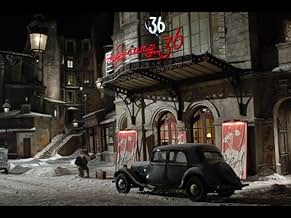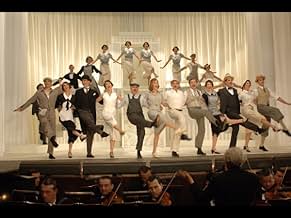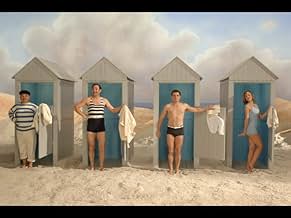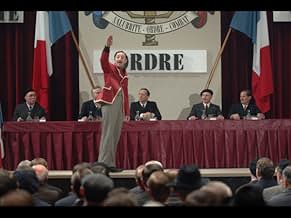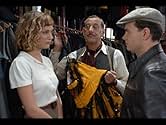VALUTAZIONE IMDb
6,5/10
3002
LA TUA VALUTAZIONE
Aggiungi una trama nella tua linguaWhen Chansonia, a nightclub, is shut down by the landlord, the stage manager Pigoil is forced to look for a new job. He finds hope when he discovers a young woman with a lovely singing voice... Leggi tuttoWhen Chansonia, a nightclub, is shut down by the landlord, the stage manager Pigoil is forced to look for a new job. He finds hope when he discovers a young woman with a lovely singing voice.When Chansonia, a nightclub, is shut down by the landlord, the stage manager Pigoil is forced to look for a new job. He finds hope when he discovers a young woman with a lovely singing voice.
- Regia
- Sceneggiatura
- Star
- Candidato a 1 Oscar
- 3 vittorie e 7 candidature totali
Recensioni in evidenza
Pigoil (Gerard Jugnot) runs a small vaudeville like theater, the Chansonia, in the Faubourg section of Paris. His wife is a "star" of the theater and the rest of the performers are a tight-knit group. Perhaps, too close, for Pigoil is given a double whammy one day. First, his wife has been sleeping with not one, but, two of the other troupe members and, even more sadly, the owner of the building can not pay his debts (it is the depression everywhere) and commits suicide. Soon, Pigoil and his young, idolized son Jojo are barely scraping by. But, then, Pigoil makes a deal with the Fascist like gentleman who truly runs the neighborhood. Can his show group have one month to make the theater profitable again? The ruthless man agrees to give them a chance, for he has his eye on one of their newest performers, a beautiful young singer named Douce. Will the Chansonia become successful once more? This is an unusual look at life in the depression, for it has a French setting, where fascism was brewing in neighboring Germany and in France. There are many subplots to the main one, including one of an agoraphobic music teacher, residing across from the Chansonia, who was once a leading song writer and who has an unlikely connection to Douce. Needless to say, the recreation of the former theater district is very fine, as are the costumes, the cast, the story, and the direction. Therefore, if you like foreign films and unusual tales, put this on your list for future viewing. It is a fine example of quality French cinematic achievements.
If this film had been produced 60 to 70 years ago,it probably would have been directed by Jean Renoir and starred Jean Gabin as one of the central figures. 'Faubourg 36' (or as it is being distributed in English speaking countries as 'Paris 36')is a film that takes place in Paris, just before world war 2,when political tensions were at a boiling point between left leaning French & their ultra conservative right wing counterpoint (which would eventually embrace the Nazi party in Germany,especially when Hitler marched into Paris in the 1940's). A (failing)theatrical troupe,bent on preserving their beloved theater tries to pull things back together,they get support from some of the locals (including an alleged Communist,who claims he was in the Red Brigade in Russia),a young lass trying to break into the singing profession,a (mostly)unfunny comic & enough well meaning persons to try and bring things together. A corrupt local political figure,who wants to do little more than bring the ruination of the theater also looms. The film is complimented by a cracker jack cast of French professionals who turn in a splendid job of acting. The screenplay, although something of an overstuffed sandwich of sorts,is still well played out. The film features several songs,most of which are performed by the cast,themselves. At times,this film has a Busby Berkley feel to it (which is not a bad thing). In French with English subtitles. Rated PG-13 by the MPAA,this film contains a bit of rude language,some suggestive material that parents of very young children may not appreciate,and some violence (but nothing too gory that could disturb some sensitive audiences). Well worth a look.
Go to IMDb.com and enter the title: "Paris 36" and what do you get?... VOILA! "Faubourg 36"! Therein lies the problem: Apparently, someone set out to make one movie...and ended up making a completely different one! This bizarre Paris/Faubourg dichotomy plagues the movie throughout, but particularly during the last half!
"Paris" did, however, get off to a relatively good start...Showing a lot of promise, in a number of different areas: The inter-action between lead characters seemed brisk and focused; the sets had a very authentic mid-30's Paris look and feel; Music that had just the right mix of melancholy, nostalgia and pre-war glibness and sung with just the right inflection and ring; and different back stories...But it all started sputtering about half way through. The last half was a total mess. Absolutely nothing worked! I can't imagine what was going though Writer/Director Christophe Barratier's mind, as he pressed on with this project!
As "Paris" progressed, the characters' actions became constantly more erratic, unpredictable and demonstrated a continually escalating degree of incongruity with the personality and motives of each character. Protagonists capriciously waltzed in and out of the movie, with little or no explanation. Because of this, the last half of "Paris" takes on a dues ex machine tainted storyline much more akin to a fairy tale or the romantic daydreams of a 14 year-old Parisian girl. 2**
"Paris" did, however, get off to a relatively good start...Showing a lot of promise, in a number of different areas: The inter-action between lead characters seemed brisk and focused; the sets had a very authentic mid-30's Paris look and feel; Music that had just the right mix of melancholy, nostalgia and pre-war glibness and sung with just the right inflection and ring; and different back stories...But it all started sputtering about half way through. The last half was a total mess. Absolutely nothing worked! I can't imagine what was going though Writer/Director Christophe Barratier's mind, as he pressed on with this project!
As "Paris" progressed, the characters' actions became constantly more erratic, unpredictable and demonstrated a continually escalating degree of incongruity with the personality and motives of each character. Protagonists capriciously waltzed in and out of the movie, with little or no explanation. Because of this, the last half of "Paris" takes on a dues ex machine tainted storyline much more akin to a fairy tale or the romantic daydreams of a 14 year-old Parisian girl. 2**
I loved it! Boz Luhrmann meets Cinema Paradiso in numerous ways. The plot is simple, as others here have already described. But it retains an abundance of charm. The undercurrents of antisemitism and fascism that were persistent in 1936 France are themes rarely seen on screen. Ditto for the Communist workers' movement during the same time. The clashes between these two groups were inevitable, and this film depicts that struggle brilliantly, without preaching to us or hitting us over the head with it. All the acting, singing and dancing are extremely well-done, and the cinematography, while Luhrmann-esquire is engaging. Best of all perhaps is the music. This film is destined to be a classic, and will always be on my favorites list. The only thing I would change is that I would retain the original title. The audience for this film is sophisticated enough to handle it.
Christophe Barratier found box office success in France in 2004 with his cute feel-good story The Chorus/Les choristes, which was about how a new music teacher brought humanity to a rural French reform school just after WWII by starting a boys' chorus. This also made newcomer Jean-Baptiste Maunier into a French teen icon. Faaubourg 36 is a glitzier, more musical (as in song-and-dance), more nostalgic period drama meant to evoke French films of the Thirties through its focus on a little working class Paris music hall called Chansonia. As the film opens, financial problems lead a mean magnate called Galapiat (Bernard-Pierre Donnadieu) to shut Chansonia down. But it's 1936, and in the spirit of socialist fervor (and universal labor-management strife) signaled by the rise of Leon Blum's Popular Front, the employees decide to take over Chansonia and run it themselves, on no money. This effort is spearheaded by the stage manager Germain Pigoil (Gerard Jugnot). Pigoil's life has filled with heartbreak. His dancer wife Viviane (Elisabeth Vitali) has left him and the state has chosen to take away his beloved accordionist son Jojo (Maxence Perrin) and send him to live with Viviane.
Trying to create triumph out of adversity, Pigoil designates an awkward song-and-dance guy called Jacky Jacquet (Kad Merad) and a militant (and Jewish) leftist called Emile "Milou" Leibovich (Clovis Cornillac) to reopen the shuttered musical theater in uneasy cooperation with Galapiat. The show must go on! This seems a feeble prospect without financial backing, till the three men get lucky when a young newcomer nicknamed Douce (Nora Arnezedzer) turns up at tryouts. She's talented, pretty, and clearly a crowd-pleaser capable of selling tickets and keeping the place going. Her presence provides further insurance when the local boss turns out to like her.
The ups and downs of the plot include depiction of the pervasive anti-Semitism of the extreme Right and the exacerbated hostilities between labor and ownership. There are little tragedies, but everything is softened and ends happily. Seekers of cinematic edge should look elsewhere. I found it hard to engage with the story, because it's too derivative, stereotypical, and diffuse. Production values are excellent and the music hall performances, if sometimes borderline cringe-worthy, carry through the period flavor. And there are some catchy tunes and sprightly stage turns as well.
I saw this film when it was screened last summer at Saul Zaentz Studios in Berkeley by Tom Luddy, Co-Director of the Telluride Film Festival and the consensus of those then present seemed to be that 'Paris 36' (which has been picked up by Sony Pictures Classics) wasn't interesting or unusual enough to show at Telluride.
But 'Paris 36' seems likely to do well with the more general US subtitles-film audience, and makes perfect sense as the "gala opening film" for the FSLC-UniFrance co-sponsored Rendez-Vous with French Cinema--though in my opinion last year's first night presentation, Claude Lelouch's 'Roman de Gare,' made a much more interesting opener.
Trying to create triumph out of adversity, Pigoil designates an awkward song-and-dance guy called Jacky Jacquet (Kad Merad) and a militant (and Jewish) leftist called Emile "Milou" Leibovich (Clovis Cornillac) to reopen the shuttered musical theater in uneasy cooperation with Galapiat. The show must go on! This seems a feeble prospect without financial backing, till the three men get lucky when a young newcomer nicknamed Douce (Nora Arnezedzer) turns up at tryouts. She's talented, pretty, and clearly a crowd-pleaser capable of selling tickets and keeping the place going. Her presence provides further insurance when the local boss turns out to like her.
The ups and downs of the plot include depiction of the pervasive anti-Semitism of the extreme Right and the exacerbated hostilities between labor and ownership. There are little tragedies, but everything is softened and ends happily. Seekers of cinematic edge should look elsewhere. I found it hard to engage with the story, because it's too derivative, stereotypical, and diffuse. Production values are excellent and the music hall performances, if sometimes borderline cringe-worthy, carry through the period flavor. And there are some catchy tunes and sprightly stage turns as well.
I saw this film when it was screened last summer at Saul Zaentz Studios in Berkeley by Tom Luddy, Co-Director of the Telluride Film Festival and the consensus of those then present seemed to be that 'Paris 36' (which has been picked up by Sony Pictures Classics) wasn't interesting or unusual enough to show at Telluride.
But 'Paris 36' seems likely to do well with the more general US subtitles-film audience, and makes perfect sense as the "gala opening film" for the FSLC-UniFrance co-sponsored Rendez-Vous with French Cinema--though in my opinion last year's first night presentation, Claude Lelouch's 'Roman de Gare,' made a much more interesting opener.
Lo sapevi?
- QuizFaubourg is not French for "the district." It is a contraction of "faux bourg", French for "false town" and were used to designate smaller towns attached to larger towns or cities. A lot of these faubourgs were independent cities until they were attached to Paris and lost all independence around during the 17th and 18th century. A new outer wall was later erected around the city. These faubourgs, especially those on the East side, were usually blue collar, with a very active night life.
- BlooperWhen Jacky accidentally turns on the radio while Pigoil is talking to his wife and her new lover, the radio is very loud immediately after Jacky flips the switch. On this type of old tube amplified radio, it would take several seconds for the tubes to heat up and amplify any signal, and the volume would go up very slowly.
- ConnessioniFeatured in The 82nd Annual Academy Awards (2010)
I più visti
Accedi per valutare e creare un elenco di titoli salvati per ottenere consigli personalizzati
- How long is Paris 36?Powered by Alexa
Dettagli
- Data di uscita
- Paesi di origine
- Siti ufficiali
- Lingua
- Celebre anche come
- Paris 36
- Luoghi delle riprese
- Surtainville, Manche, Francia(beach scenes by the end)
- Aziende produttrici
- Vedi altri crediti dell’azienda su IMDbPro
Botteghino
- Lordo Stati Uniti e Canada
- 851.540 USD
- Fine settimana di apertura Stati Uniti e Canada
- 44.690 USD
- 5 apr 2009
- Lordo in tutto il mondo
- 12.940.622 USD
- Tempo di esecuzione
- 2h(120 min)
- Colore
- Mix di suoni
- Proporzioni
- 2.35 : 1
Contribuisci a questa pagina
Suggerisci una modifica o aggiungi i contenuti mancanti





